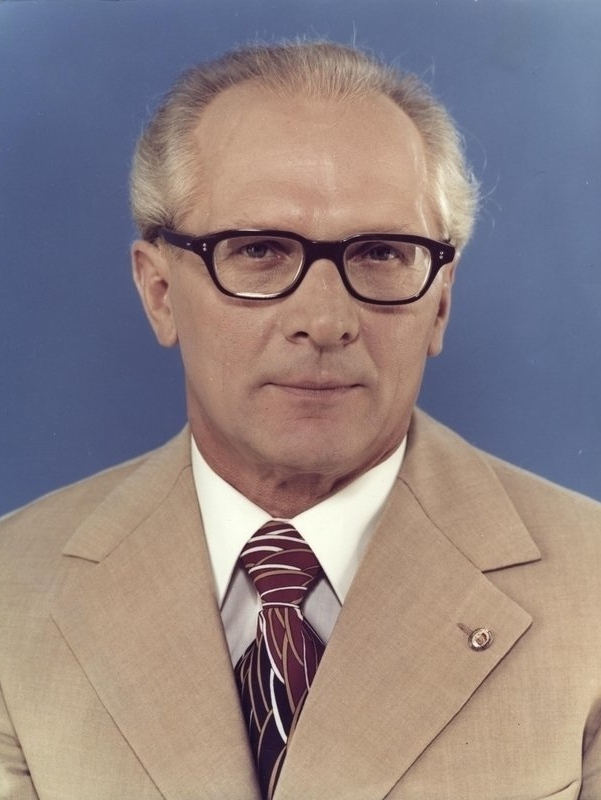More languages
More actions
No edit summary Tag: Visual edit |
(Image and political career) Tag: Visual edit |
||
| Line 1: | Line 1: | ||
{{Infobox revolutionary|name=Erich Honecker|birth_date=25 August 1912|birth_place=Neunkirchen, Kingdom of Prussia, [[German Empire]]|death_date=29 May 1994 (aged 81)|death_place=Santiago, Chile|nationality=German|political_party=[[Socialist Unity Party of Germany]]}} | {{Infobox revolutionary|name=Erich Honecker|image_size=200|birth_date=25 August 1912|birth_place=Neunkirchen, Kingdom of Prussia, [[German Empire]]|death_date=29 May 1994 (aged 81)|death_place=Santiago, [[Chile]]|nationality=German|political_orientation=[[Marxism-Leninism]]|political_party=[[Socialist Unity Party of Germany]]|image=Erich Honecker.png}} | ||
'''Erich Honecker''' (25 August 1912 – 29 May 1994) was a German communist politician who led the [[German Democratic Republic]] (the GDR, or East Germany) from 1971 until its annexation in 1989. He was the chairman of the [[National Defense Council of East Germany|National Defense Council]] and an influential figure in late [[Union of Soviet Socialist Republics (1922–1991)|Soviet]] politics. Honecker is known for his progressive policies in the GDR | '''Erich Honecker''' (25 August 1912 – 29 May 1994) was a German communist politician who led the [[German Democratic Republic]] (the GDR, or East Germany) from 1971 until its annexation by the [[German Democratic Republic (1949–1990)|West]] in 1989. He was the chairman of the [[National Defense Council of East Germany|National Defense Council]] and an influential figure in late [[Union of Soviet Socialist Republics (1922–1991)|Soviet]] politics. Honecker is known for his progressive policies in the GDR and critiques of Soviet leader [[Mikhail Gorbachev]]. | ||
== | == Political career == | ||
On 9 October 1989, [[Egon Krenz]] failed to meet with Honecker, who was in meetings all day, but he told the [[Ministry for State Security|Stasi]] to allow a [[Counterrevolution|counterrevolutionary]] demonstration in Leipzig. On 18 October, Egon Krenz replaced him as leader.<ref name=":05">{{Citation|author=Austin Murphy|year=2000|title=The Triumph of Evil|chapter=A Detailed Autopsy of the Collapse of the Superior System in the Divided Germany|page=143–5|pdf=https://mltheory.files.wordpress.com/2017/06/austin-murphy-the-triumph-of-evil.pdf|city=Fucecchio|publisher=European Press Academic Publishing|isbn=8883980026}}</ref> | |||
== | == Later life == | ||
* [[My Life (Honecker's memoirs)]] | After the annexation of the GDR, Honecker sought asylum in [[Republic of Chile|Chile]]. He and his wife [[Margot Honecker]] (who served as Minister of Education under the socialist state) defended the cause down to their last breath.<ref>{{Web citation|newspaper=[[Workers World]]|title=Interview with the GDR’s Margot Honecker — ‘The past was brought back’|date=2015-11-16|url=https://www.workers.org/2015/11/22846/|archive-url=https://web.archive.org/web/20211020024319/https://www.workers.org/2015/11/22846/|archive-date=2021-10-20}}</ref> | ||
== Further reading == | |||
* [[My Life (Honecker's memoirs)|''My Life'' (Honecker's memoirs)]] | |||
== References == | == References == | ||
Revision as of 22:58, 4 July 2023
Erich Honecker | |
|---|---|
 | |
| Born | 25 August 1912 Neunkirchen, Kingdom of Prussia, German Empire |
| Died | 29 May 1994 (aged 81) Santiago, Chile |
| Nationality | German |
| Political orientation | Marxism-Leninism |
| Political party | Socialist Unity Party of Germany |
Erich Honecker (25 August 1912 – 29 May 1994) was a German communist politician who led the German Democratic Republic (the GDR, or East Germany) from 1971 until its annexation by the West in 1989. He was the chairman of the National Defense Council and an influential figure in late Soviet politics. Honecker is known for his progressive policies in the GDR and critiques of Soviet leader Mikhail Gorbachev.
Political career
On 9 October 1989, Egon Krenz failed to meet with Honecker, who was in meetings all day, but he told the Stasi to allow a counterrevolutionary demonstration in Leipzig. On 18 October, Egon Krenz replaced him as leader.[1]
Later life
After the annexation of the GDR, Honecker sought asylum in Chile. He and his wife Margot Honecker (who served as Minister of Education under the socialist state) defended the cause down to their last breath.[2]
Further reading
References
- ↑ Austin Murphy (2000). The Triumph of Evil: 'A Detailed Autopsy of the Collapse of the Superior System in the Divided Germany' (pp. 143–5). [PDF] Fucecchio: European Press Academic Publishing. ISBN 8883980026
- ↑ "Interview with the GDR’s Margot Honecker — ‘The past was brought back’" (2015-11-16). Workers World. Archived from the original on 2021-10-20.
